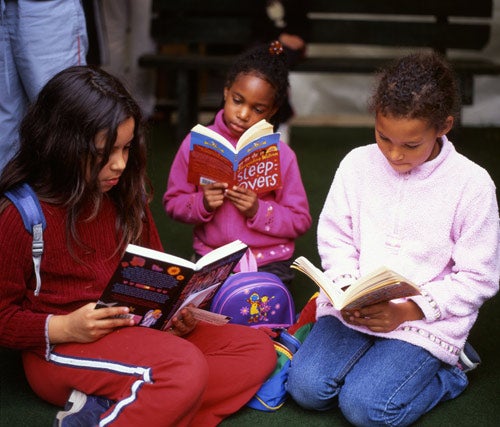Children turn off the TV and open a book instead

Your support helps us to tell the story
From reproductive rights to climate change to Big Tech, The Independent is on the ground when the story is developing. Whether it's investigating the financials of Elon Musk's pro-Trump PAC or producing our latest documentary, 'The A Word', which shines a light on the American women fighting for reproductive rights, we know how important it is to parse out the facts from the messaging.
At such a critical moment in US history, we need reporters on the ground. Your donation allows us to keep sending journalists to speak to both sides of the story.
The Independent is trusted by Americans across the entire political spectrum. And unlike many other quality news outlets, we choose not to lock Americans out of our reporting and analysis with paywalls. We believe quality journalism should be available to everyone, paid for by those who can afford it.
Your support makes all the difference.The relentless "dumbing down" of the life of the average primary school pupil may be over, according to new research published on World Book Day today.
Watching television has become a less popular pastime amongst the nation's nine to 11-year-olds for the first time in years, figures compiled by the National Foundation for Educational Research indicate.
The survey of 4,500 children shows that only 55 per cent prefer watching TV to reading – compared with 62 per cent in a similar survey four years ago. It also reveals that the decline in popularity of reading amongst the same age group has been halted, with nearly 70 per cent of nine-year-olds and 60 per cent of 11-year-olds saying they enjoy reading stories – almost the same percentage as four years previously. However, the halt in the decline follows a major slide in enjoyment of reading between 1999 and 2003. "Children's enjoyment of reading has stopped declining sharply," the report says. "Their attitudes have held steady over the four-year period."
But the survey does show poetry reading is on the decline amongst both boys and girls, with only 52 per cent of nine-year-olds enjoying it compared with 68 per cent eight years ago – and 43 per cent of 11-year-olds compared with 58 per cent.
Comics appear to be youngsters' favourite form of reading – overtaking stories for the first time.
Dr Marian Sainsbury, who conducted the research for the NFER, said: "This is good news as our previous surveys revealed a sharp drop in enjoyment which has now halted.
"This is a reminder to everyone in society, not just parents and teachers, to do everything they can to foster children's enjoyment of reading. Let's get the figures moving upwards again."
The report, published to coincide with World Book Day, concludes there can be "cautious optimism" over the survey's findings and says that government encouragement of more flexibility and creativity in the curriculum could have helped foster more of a love of reading.
Since the earlier survey, ministers have relaxed the requirement for every seven-year-old to sit end-of-year tests in maths and English. Instead, pupils can sit them when their teachers consider they are ready to take them.
But it also reveals that boys are significantly less positive about reading than girls, with 21 per cent of nine-year-old boys saying they are not interested in books compared with 13 per cent of girls. For 11-year-olds the figures were 21 per cent and 14 per cent respectively.
Thirteen per cent of nine-year-old boys said they found reading difficult compared to only nine per cent of girls. The figures were 10 per cent and five per cent respectively for 11-year-olds.
In addition, 24 per cent of nine-year-old boys said they did not like reading at home, compared with 18 per cent of girls. The figure for boys rose to 27 per cent amongst 11-year-olds, while it remained the same for girls.
Join our commenting forum
Join thought-provoking conversations, follow other Independent readers and see their replies
Comments